We’re all in this together
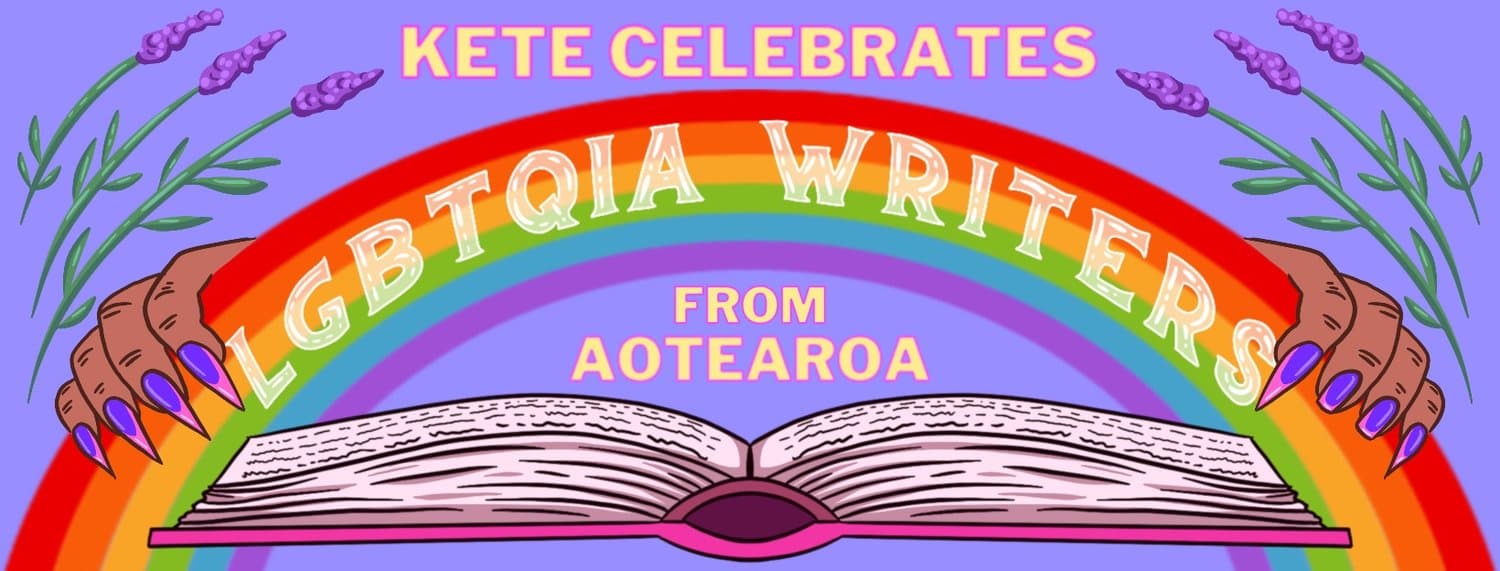
Simie Simpson crafts a reading list of recent books by Aotearoa’s LGBTQIA writers to mark Auckland Pride and her final year as Chair of samesame but different the LGBTQIA+ literary festival happening this week. Browse the clickable reading list here.
Pride month is held in February in Auckland and for many of us, it is a time to celebrate our existence, because like for many marginalised groups, existence is resistance, right. The beginnings of Pride, around the world and in Aotearoa, were an act of defiance and resistance. Standing up and being visible, being ‘proud’ of who we are or even who we are yet to become. Recent events worldwide and at home have highlighted that now, more than ever, our freedom is intertwined. We cannot be free until we are all free.
In my final year as the Chair of samesame but different, the LGBTQIA+ literary festival held during Pride, I have been reflecting a lot on the beginnings and endings of things. I’ve been thinking a lot about Peter Wells, the founder of this festival and writers like Witi Ihimaera, Renée and Ngahuia Te Awekotuku. Together they laid the foundation for other LGBTQIA+ writers in Aotearoa; they inspired and encouraged other writers, and they showed publishers and mainstream festivals that our community had a story to tell and an audience for those stories.
Every time the board sits down to plan a new festival and I think we have created something new and exciting; dare I say it, ‘groundbreaking’, I look back at a festival programme from Peter and can see the ground was already laid. Peter’s programming reflected the diversity within our community and created a unique space for LGBTQIA+ writers where they are able to discuss queer literature somewhere it is both implicitly and contextually understood; where authors don’t have to explain themselves as the audience is alongside them in their journey. Since Peter passed, the board of samesame has felt a huge responsibility to continue the work of creating this space, uplifting the work of our incredible LGBTQIA+ writers and encouraging our community to tell their stories — to show that we want to hear them, that we need them.
I think that is part of the reason this felt so hard to write. I can’t stress enough that this list can only ever skim the surface of the many amazing LGBTQIA+ writers who are punching above their weight in our literary scene. I have tried to focus on recent work, but seriously, hit up your local bookshop and ask them about other LGBTQIA+ writers and check out plays, online and other forms of writing — not everyone publishes books; there are some incredible queer comic artists, playwrights, journalists, activists, and some writers who only share their work online
A GUIDE TO DIPPING YOUR TOES IN THE QUEER WATERS: ANTHOLOGIES
Recently, we have had some anthologies that are just …argh, so good! So many of the editors of these anthologies are literary overachievers — writing on various platforms, performing and creating events. Just a note here: where you can and if you can, support these writers — buy their books, donate to small presses, literary journals and go to literary events, it makes it possible for everyone to keep doing what they do.
Out Here: An Anthology of Takatāpui and LGBTQIA+ Writers from Aotearoa came out (no pun intended) in November 2021. Editors Chris Tse and Emma Barnes have created something that will ENDURE in Out Here. I am not sure how to describe this beautiful collection of writing other than to say that for me personally, it is like the Shorter Oxford Dictionary: it is big, desirable and has everything you want in it. Also, shout out to Jack Trolove’s beautiful cover, making it way more spunky than the Shorter Oxford.
Editors Damien Levi and Amber Esau have gifted the world their debut poetry collection Spoiled Fruit: Queer Poetry from Aotearoa from micro press Bad Apple. It’s hot, it’s new as, and it’s delicious. Chris Tse and essa may ranapiri have much sexier, smarter reviews than I can ever write of this book, so just read them if you need convincing that your life can’t be complete without this book. Also, you really should check out Bad Apple Gay.
Issue 10 of Overcom by editors Grace Shelley and Mary Mosteller is a Queer Literary Journal and you can find past issues (and stickers) here. This collection of poetry, fiction, essays and art has been around since 2019 which is an accomplishment for mainstream literary journals, but I can’t even do the math to work out how long it’s been going in gay years. They publish two a year and you can collect the set in a variety of ways.
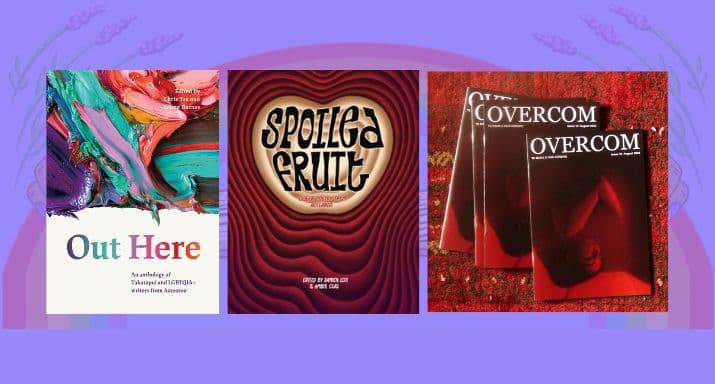
A QUESTION WE NEED ANSWERED: WHY ARE THERE SO MANY LGBTQIA+ POETS AND WHY DO THEY MOSTLY LIVE IN TE WHANGANUI A TARA?
If you are questioning, you might also ask how they also find time for being editors, musicians, journalists, poet laureates, activists, performers, engineers, and all the other things. I just couldn’t make this list any shorter, because it was causing me physical pain to do so, so here we go:
Anomalia (2022) by Cadence Chung made me feel like I wasted my twenties. Echidna (2022) by essa may ranapiri made me wish I could write like this. Head Girl (2020) by Freya Daly Sadgrove made me wish I was Freya. Short Films by Tate Fountain made me cry. Super Model Minority (2022) by Chris Tse made me buy another copy so I could share with friends. The Surgeon’s Brain (2022) by Oscar Upperton made me wonder how many others hid themselves. The Artist (2023) by Ruby Solly, following on from Tōkū Pāpā (2021) made me feel most of the above.
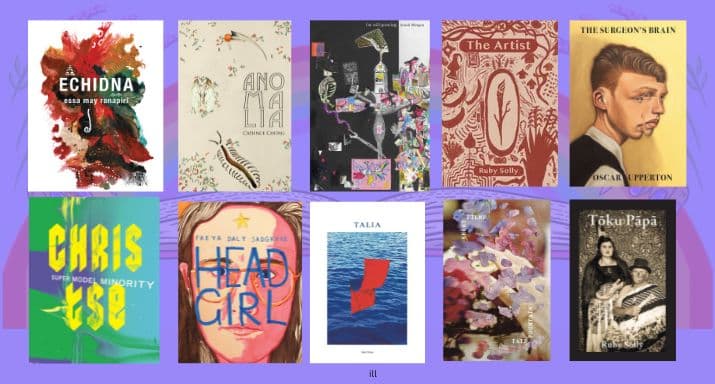
JUST RELEASED OR COMING SOON — POETRY
i’m still growing (Feb 2024) by Josiah Morgan Talia (2024) by Isla Huia.
ESSAYS YOU NEED TO READ
Honouring Our Ancestors: Takatāpui, Two Spirit and Indigenous LGBTQ+ Well-being Edited by Leonie Pihama and Alison Green these essays feature writers from Aotearoa and the Turtle Islands.
Essays from writer, activist and disability rights activist Henrietta Bollinger Articulations (2023).
SOMETIMES, WE READ TO SEE OURSELVES AND SOMETIMES TO UNDERSTAND OTHERS
All of these books share unique perspectives of LGBTQIA+ lives, and cover some really interesting personal and public moments in history:
The Queen’s Wife (2023) by Joanna Drayton One of Them (2023) by Shaneel Lal Faking It: My Life in Transition (2021) by Kyle Mewburn Straight Up (2022) by Ruby Tui Downfall — The Destruction of Charles Mackay (2022) by Paul Diamond TThe Robert Lord Diaries (2023) by Chris Brickell.
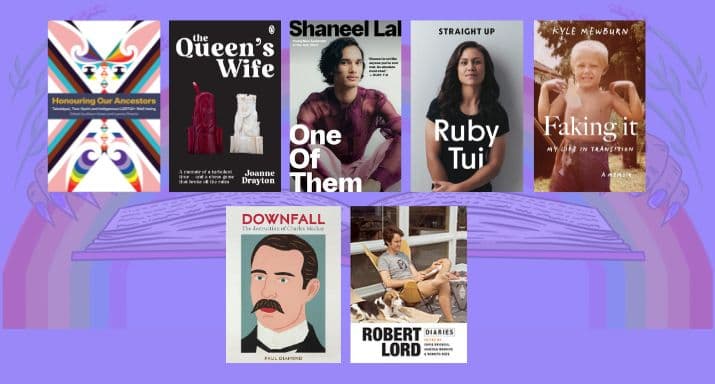
HOW FICTITIOUS IS FICTION REALLY?
Because Nancy Drew is your homegirl
Nancy Business (2021) and by R W R McDonald is a funny, sweet and nostalgic read. You will need to start with the first in the series, The Nancys which will leave you wanting to read more…
Things I don’t normally read but these books changed my mind and if they don’t change yours, we can’t be friends...
Science fiction is something I watch, I am a total geek for it, but I never read it. If this is you, get over yourself and buy a copy of Na Viro (2022) by Gina Cole, Gina has taken the advice of Toni Morrison and written the book she wanted to read, and just, you know, created a whole new genre — Pasifikafuturism.
Home Theatre (2022) by Anthony Lapwood. Straight up, I struggle with short stories; there’re just too many changes in one book, too much resetting and having to get to know new characters all over again. It’s hard work for an introvert, however, I read this in almost one sitting and I know I will read it again soon.
Short story collection shout out too to Please, Call Me Jesus (2021) by Sam Te Kani, which made me blush
Dream Girl (2023) by Joy Holley. Again, short stories. So clever and sharp, I might not be cool enough for this book. You probably are.
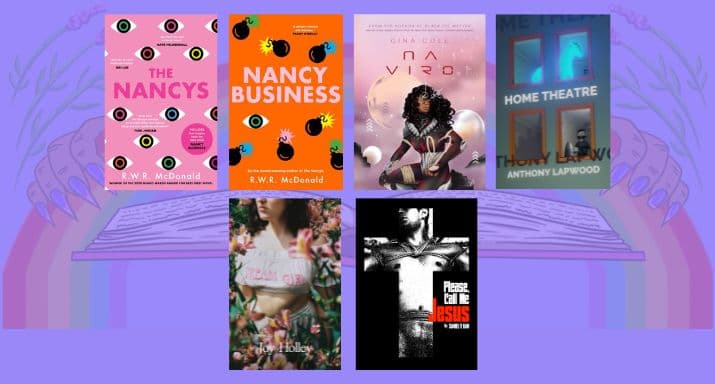
If I have to fight you for the last copy in a bookshop for these, I will
Tauhou (2022) by Kotuku Titihuia Nuttall, I read this book a year ago now, and I still think about it. Just adding it to this list has made me want to reread it.
How to Loiter in a Turf War (2022) by Coco Solid. Everyone needs to read this. It has so much to say about gentrification and belonging and it will carve out a place in your heart and reside there.
Just released — fiction
kitten (Feb 2024) by Olive Nuttall and Amma (March 2024) by Saraid de Silva. Dealing with perspectives, past pain, love, the in-between-spaces, and family drama. I am always here for family drama. Especially other peoples’. I am adding these to my read-next pile that is always in danger of overwhelming me in the best of book nerd ways.
ONE FOR YOUNGER READERS
Rere Atu Taku Poi! Let my Poi Fly by Tangaroa Paul. I just received a copy of this and I am living for it. It is such a beautiful affirming story, and you all need this in your life.
SHOUT OUTS TO: NOT TOTALLY QUEER BUT THEY'RE HERE FOR YOU
Ngā Kupu Wero edited by Witi Ihimaera and Te Awa o Kupu edited by Vaughan Rapatahana and Kiri Piahanga-Wong while not queer anthologies feature some great writing by Takatāpui writers.
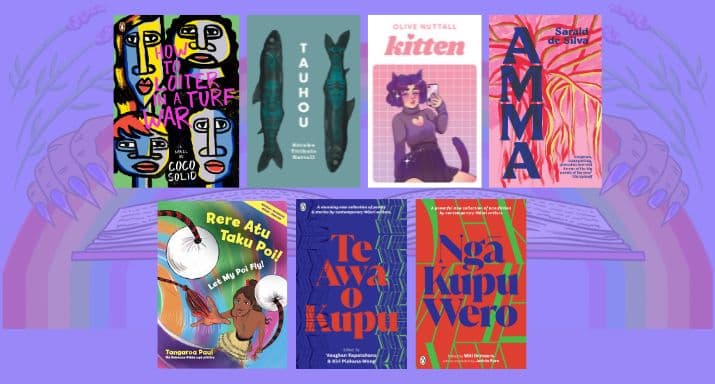
About Simie Simpson
Simie (Te Āti Awa, she/her/ia) was raised in Te Wai Pounamu and has flirted with living in Tāmaki Makaurau and the Kaipara but is firmly ensconced back in Te Whanganui-a-Tara. She has worked in bookselling, publishing, and libraries for over two decades, as well as being a reviewer and editor for The Sapling and a judge in the NZ Children’s Book Awards. She is the Programmes Manager for Read NZ Te Pou Muramura and the current Chair of the samesame but different board, an LGBTQI+ literary festival held during Auckland Pride. When she isn’t reading or doing other book things, she is walking her dog on Pito-one beach.
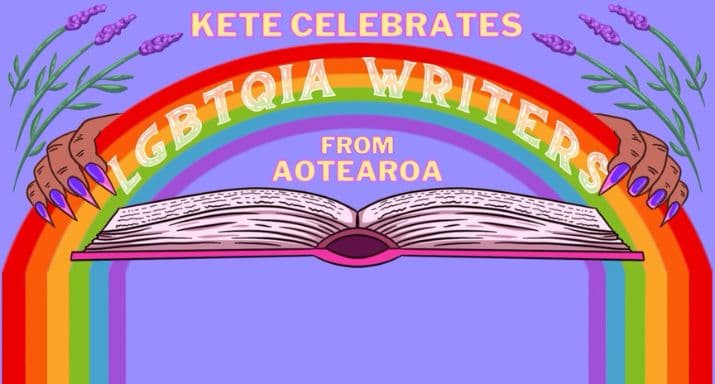
Kete thanks Pounamu Wharekawa for the banner and illustrations
Pounamu Wharekawa (Ngai te Rangi, they / themme / ia) is an angry indigenous bad bitch, fine artist, illustrator and muralist. They make art that speaks about intersections of identity through the lens of a queer, small town turned urban turned small town again Māori living their best boring life back in the house they grew up in beautiful Whāingaroa